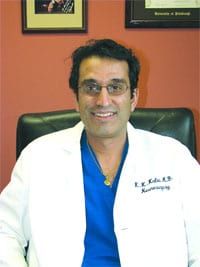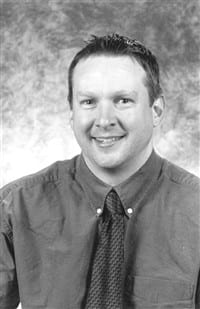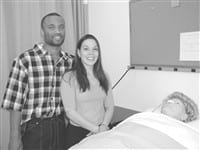Brain Power This Neurosurgeon Doesn’t Let Anything Get on His Nerves
Dr. Kamal Kalia opened his desk drawer and pulled out a few of the many greeting cards packed inside.
“I keep every one of them,” he told The Healthcare News, noting that these are from patients and — in most cases — very happy customers.
One was from a woman who had suffered a brain tumor; she sent the card just before Thanksgiving. “This is a time when we offer thanks,” she started, noting that, in this case, she was thanking him for a successful procedure that dramatically changed her fortunes.
Another card was from a sufferer of trigeminal neuralgia (TN), an excruciatingly painful nerve disorder (more on it later). Her note had a similar tone and started with, ‘thank you for giving me my life back.”
Kalia leafed through a few others and, while doing so, said that such messages are one of the many rewards that are part and parcel to being a neurosurgeon. And they provide some proof that enduring four years of college, another four years of medical school, and a six-year residency to arrive at this point in his career was all well worth it.
Kalia is one of a team of three neurosurgeons affiliated with Mercy Medical Center in Springfield and medical director of the Trigeminal Neuralgia Care Center, the only facility of its kind in the region and one of the few in the country, offering comprehensive treatment options for TN, hemifacial spasm, and other cranial nerve disorders.
Work with TN sufferers comprises maybe 20{06cf2b9696b159f874511d23dbc893eb1ac83014175ed30550cfff22781411e5} of the workload for Kalia, a native of California, who came to the Pioneer Valley at the behest of a physician, Dr. Munir Abbasy, who would eventually become his mentor and remain his good friend until the plane he was piloting crashed at Barnes Municipal Airport, causing injuries that would soon take his life.
The balance of Kalia’s time is devoted to surgery to treat everything from tumors to neck pain to carpal tunnel syndrome. He has seen advancing medical science change the way many of these procedures are done, but what hasn’t changed is the variety and exceedingly rewarding nature of the work.
“You’ll hear from carpal tunnel patients that they haven’t slept in weeks and that it’s great to be able to actually get some rest,” he said. “That’s what I like about this work — you’re helping people; you’re making their lives better.”
Of a Mind
Kalia told The Healthcare News that a thesaurus-load of adjectives have been used in attempts to describe the discomfort associated with TN, which is characterized by episodes of intense, stabbing, electrical-shock-like pain affecting one side of the face.
He settled on “it’s like a lighting bolt hitting you in the side of the face,” and said such terminology would explain why someone relieved of that kind of pain would say they were given their life back.
Kalia has received hundreds of cards expressing similar sentiments over a professional career that began in the emergency room at Butler (Pa.) Memorial Hospital in 1994. Nearly three years later, he would relocate to Western Mass. and become part of Neurosurgical and Neurological Group in Springfield after Abassy convinced him to join that practice.
Much of this background information can be found on Kalia’s Web site — www.kalianeurosurgery.com. He keeps this site packed with information and features such as videos on the Sisters of Providence Health System and even specific disorders and the methods of treating them. One can click on such tabs as ‘In the OR,’ ‘Spine Surgery,’ ‘Brain Tumors,’ ‘Trigeminal Neuralgia,’ and ‘What to Expect After Surgery.’
“There’s video of neurosurgery there with me narrating,” he explained, adding that many physicians in a host of specialties have their own sites as a way to inform and communicate with patients, many of whom turn to the Internet for material on their condition; this is his way of giving them giving something accurate to look at. “We pass a lot of information on to people when they see them, and often it’s hard to digest it all.
“With the Web site, it’s almost like they’re seeing me again,” he continued. “If they have questions about the surgery — how long it’s going to take, and what happens when it’s over, for example. So I put the videos on there so when someone asks me what happens when I do a micro lumbar discectomy, they’ll know.”
When asked about a day in the life of a neurosurgeon and whether it was anything approaching typical, Kalia said that term works, although there is certainly enough variety to make each day different.
They all start early (just after 7 a.m.), he said, and will likely include a mix of procedures involving brain tumors, nerve disorders, carpal tunnel, and TN, which is a fairly rare affliction that strikes indiscriminately and is caused by a blood vessel compressing against the trigeminal nerve as it exits the brainstem.
And it is often mistaken for other things, which can prolong the pain of those who contract it, said Kalia.
“TN is a very specific type of pain that’s very commonly misdiagnosed,” he explained. “Most people will have a few teeth pulled or a few root canals done before they’re diagnosed with trigeminal neuralgia.”
The TN care center has brought relief to patients from across Western Mass. and well beyond, including Eastern Mass., Southern N.H., Vermont, Connecticut, Maine, and even Florida. He’s received calls from those living as far away as Utah, but tries, in such cases, to match up those individuals with neurosurgeons closer to home.
Kalia said he takes each Tuesday off to “get sane,” as he put it.
He does so by devoting that and whatever other time he can find to host of pursuits and passions, especially his young son.
He also finds time for tennis, radio-controlled airplanes, shooting trap (“my mother recently shipped me my shotguns”), waterskiing, snow skiing, travel, a core of good friends, and even the guitar, which he took up about three years ago.
“My wife hates it — she actually closed off the living room and put doors there because she says I’m terrible,” he said, noting that he can cause pain as well as cure it. “I am terrible, but I really enjoy it.”
Mind over Matters
Returning to the greeting cards in his desk, Kalia said he likes to hear that he’s changed so many lives for the better, and that he stacks the deck in some ways to achieve such outcomes.
“I tend to take it personally when people don’t do well,” he said, adding that he tends to accept cases where there are strong odds for a good result.
Like those when he can give someone their life back — which is reward enough for all those years in school and training.




Comments are closed.